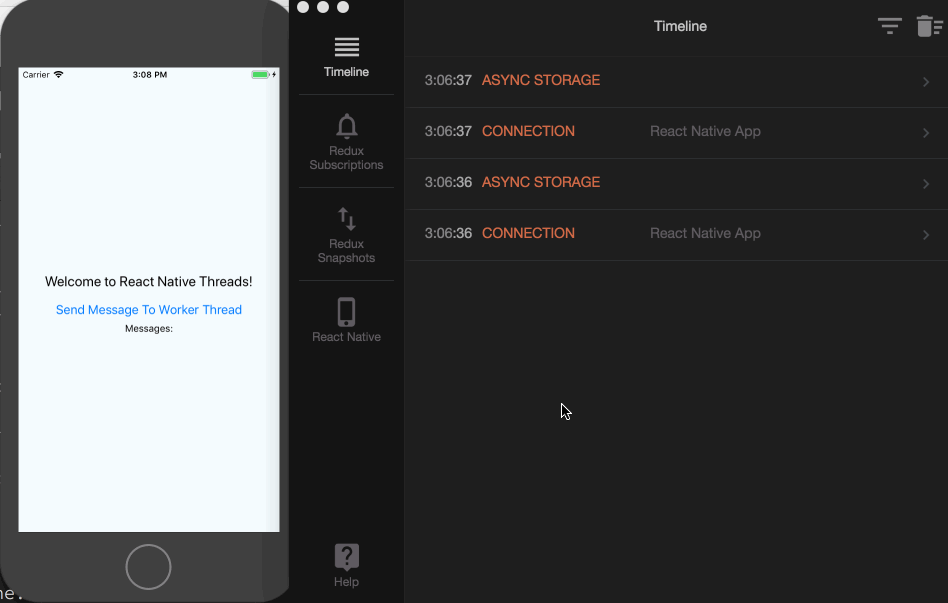@minar-kotonoha/react-native-threads
v0.0.22
Published
[](https://www.npmjs.com/package/react-native-threads) [](https://www.npmjs.com/pa
Downloads
6
Maintainers
Readme
react-native-threads
Spawn new react native JavaScript processes for CPU intensive work outside of your main UI JavaScript process.
Despite this package's name, this isn't real 'threading', but rather multi-processing.
The main tradeoff of using this library is memory usage, as creating new JS processes
can have significant overhead. Be sure to benchmark your app's memory usage and other
resources before using this library! Alternative solutions include using runAfterInteractions
or the Interaction Manager,
and I recommend you investigate those thoroughly before using this library.
Getting started
$ npm install react-native-threads --save
Mostly automatic installation
$ react-native link react-native-threads
Android
For android you will need to make a slight modification to your MainApplication.java
file. In the getPackages method pass in mReactNativeHost to the RNThreadPackage
constructor:
@Override
protected List<ReactPackage> getPackages() {
return Arrays.<ReactPackage>asList(
new MainReactPackage(),
new RNThreadPackage(mReactNativeHost) // <-- Here
);
}Also note that only the official react native modules are available from your
threads (vibration, fetch, etc...). To include additional native modules in your
threads, pass them into the RNThreadPackage constructor after the mReactNativeHost
like this:
new RNThreadPackage(mReactNativeHost, new ExampleNativePackage(), new SQLitePackage())
Manual installation
iOS
- In XCode, in the project navigator, right click
Libraries➜Add Files to [your project's name] - Go to
node_modules➜react-native-threadsand addRNThread.xcodeproj - In XCode, in the project navigator, select your project. Add
libRNThread.ato your project'sBuild Phases➜Link Binary With Libraries - Run your project (
Cmd+R)<
Android
- Open up
android/app/src/main/java/[...]/MainApplication.java
- Add
import com.reactlibrary.rnthreads.RNThreadPackage;to the imports at the top of the file - Add
new RNThreadPackage(mReactNativeHost)to the list returned by thegetPackages()method - Also note that only the official react native modules are available from your
threads (vibration, fetch, etc...). To include additional native modules in your
threads, pass them into the
RNThreadPackageconstructor after themReactNativeHostlike this:new RNThreadPackage(mReactNativeHost, new ExampleNativePackage(), new SQLitePackage())
- Append the following lines to
android/settings.gradle:include ':react-native-threads' project(':react-native-threads').projectDir = new File(rootProject.projectDir, '../node_modules/react-native-threads/android') - Insert the following lines inside the dependencies block in
android/app/build.gradle:compile project(':react-native-threads')
Windows
Windows support is not yet implemented, but PRs are welcome if you want to give it a shot!
- In Visual Studio add the
RNThread.slninnode_modules/react-native-threads/windows/RNThread.slnfolder to their solution, reference from their app. - Open up your
MainPage.csapp
- Add
using Thread.RNThread;to the usings at the top of the file - Add
new RNThreadPackage()to theList<IReactPackage>returned by thePackagesmethod
Usage
In your application code (react components, etc.):
import { Thread } from 'react-native-threads';
// start a new react native JS process
const thread = new Thread('path/to/thread.js');
// send a message, strings only
thread.postMessage('hello');
// listen for messages
thread.onmessage = (message) => console.log(message);
// stop the JS process
thread.terminate();In your thread code (dedicated file such as thread.js):
import { self } from 'react-native-threads';
// listen for messages
self.onmessage = (message) => {
}
// send a message, strings only
self.postMessage('hello');Check out the examples directory in this repo for demos of using react-native-threads
in a functioning app!
Thread Lifecycle
- Threads are paused when the app enters in the background
- Threads are resumed once the app is running in the foreground
- During development, when you reload the main JS bundle (shake device ->
Reload) the threads are killed
Debugging
Instantiating Threads creates multiple react native JS processes and can make debugging remotely behave unpredictably. I recommend using a third party debugging tool like Reactotron to aid with this. Each process, including your main application as well as your thread code can connect to Reactotron and log debugging messages.
Building for Release
You will need to manually bundle your thread files for use in a production release
of your app. This documentation assumes you have a single thread file called
index.thread.js in your project root. If your file is named differently or in
a different location, you can update the documented commands accordingly.
Note: If your single thread file is in a different location, the folder structure needs to
be replicated under ./ios and ./android/app/src/main/assets/threads.
./App/Workers/worker.thread.js => ./ios/App/Workers/worker.thread.jsbundle
./App/Workers/worker.thread.js => ./android/app/src/main/assets/threads/App/Workers/worker.thread.jsbundleFor iOS you can use the following command:
node node_modules/react-native/local-cli/cli.js bundle --dev false --assets-dest ./ios --entry-file index.thread.js --platform ios --bundle-output ./ios/index.thread.jsbundle
Once you have generated the bundle file in your ios folder, you will also need to add
the bundle file to you project in Xcode. In Xcode's file explorer you should see
a folder with the same name as your app, containing a main.jsbundle file as well
as an appDelegate.m file. Right click on that folder and select the 'Add Files to '
option, which will open up finder and allow you to select your ios/index.thread.jsbundle
file. You will only need to do this once, and the file will be included in all future
builds.
For Android create this direactory
mkdir ./android/app/src/main/assets/threads
And then you can use the following command:
node node_modules/react-native/local-cli/cli.js bundle --dev false --assets-dest ./android/app/src/main/res/ --entry-file index.thread.js --platform android --bundle-output ./android/app/src/main/assets/threads/index.thread.bundle
For convenience I recommend adding these thread building commands as npm scripts to your project.
Example App
Included in this repository is a simple example application demonstrating basic
usage of react-native-threads. Look at examples/SimpleExample/README.md for
instructions on running it. Here's how the app looks with the Reactotron debugger:

Acknowledgements
This library was heavily inspired by two other packages both under the name of
react-native-workers.
The first was https://github.com/fabriciovergal/react-native-workers , and the second was https://github.com/devfd/react-native-workers
I ended up going with devfd's implementation strategy as it seemed more flexible and feature-rich to me. At the time of this writing neither library was functioning on the latest version of react native, and neither seemed to be very actively maintained.
This library would not exist without those two reference implementations to guide me!


